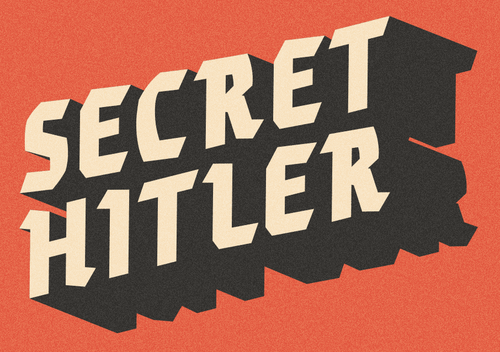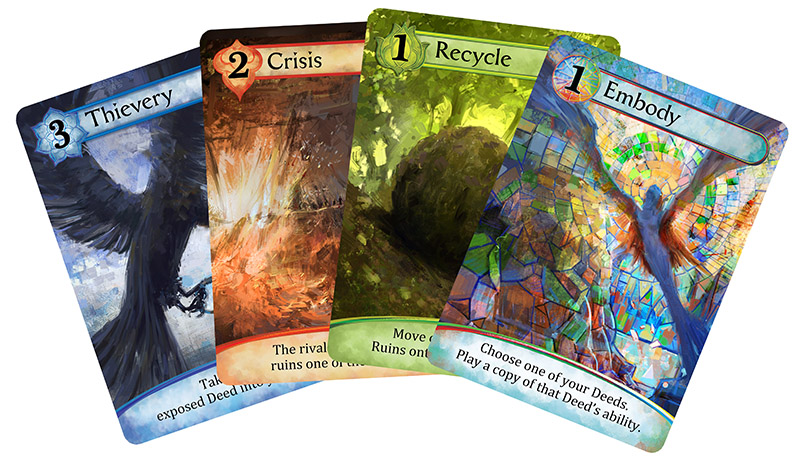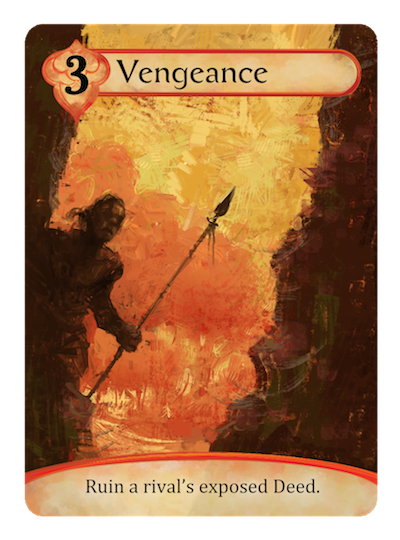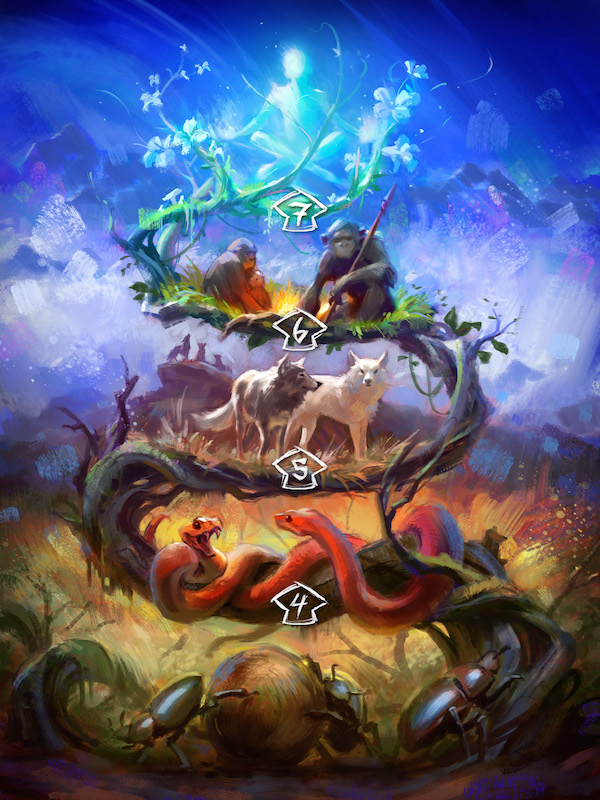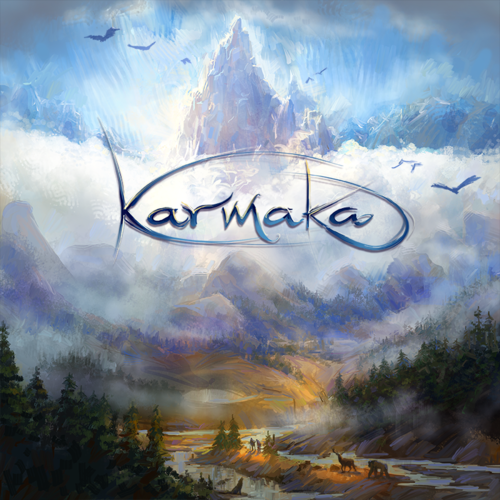As part of our December Spotlight on Karmaka, we strive to inform readers of little extra tidbits surrounding the game. Games are made by people, and one of those tidbits we enjoy is learning a little bit more about the people behind them. Some designers shy away from the public stage, while others enjoy being front and center.
In the case of Karmaka, the story itself beings with a rebranding of sorts – fitting when you get right down to it, really. You see, when it comes to designers Eddy Boxerman and Dave Burke, their tale starts in another life. One in which the two met while designing video games. Both men helped program a number of video game titles for established companies, but before long they each had caught the design bug. This in turn led to the founding of Hemisphere Games as they worked towards creating the indie digital game Osmos.
The moderate success of Osmos in turn had them reinvent their design ambitions once more, except this time their ideas took them completely into the analog world. What initially started as an idea about paying things forward blossomed into the game we now know as Karmaka. And the gaming world is all the richer for it.
In the card game Karmaka, players continually deal with the theme of karma and the positives and negatives of living through several life cycles. Throughout the game, you must continually weigh using cards against your opponents for advancement at the risk of those card coming back to haunt you later on, all while trying to progress a little better each time through. Which, in a way, is how these guys could describe the path that brought them to making this game.
Art imitating life, and all that.
But why not hear from the karmic source itself? To get a bit more detail about the process of how Karmaka came to be and what it took to have an idea be reborn as a solid game, we sat down with designer Eddy Boxerman himself. Hopefully this will be enlightening, and bring us a few karmic points in the process. Enjoy!
Round One Questions
CR: What was your Gateway Game?
It’s hard to say exactly when this happened and with what game, but getting introduced to D&D in Grade 5 was definitely a “moment”.
CR: What was the last game you really enjoyed playing (Karmaka)?
We had a Secret Hitler evening recently which was a blast. Ten players, three games, with inebriation setting in as the evening flowed late into the night.
CR: How big is your game collection?
Small by many geek standards – maybe 100 games or so. But we just moved a few weeks ago, so it still seemed too big, even after a cull.
CR: What is your favorite type of game to play?
I’m a sucker for Magic, Netrunner, and constructed card games in general, though I don’t have the time (or money) for them that I once did. Karmaka in a sense is a response to that. That said, I love playing lots of different types of games.
CR: How do you feel about Monopoly?
I enjoyed it as a kid, and even played it by myself when no one else wanted to play. But my options and exposure were limited then. These days, I’d rather not play it. So many better options out there.
On Karmaka
CR: Karmaka tackles the very uncommon theme of, well, karma. How did the inspiration behind the game come to be?
It actually started out as an idea for a social “economy” system that would piggyback on platforms like Facebook or Twitter and encourage people to be nice to each other. But the more I thought it, the less I believed it could – or even should – work. I started to think the concept would work better in a closed system, like a board game, and the theme of multiple lives seemed to lend itself well to a deckbuilding-like structure. I started to experiment from there…
CR: Can you think of a particularly memorable karmic moment you witnessed by yourself or someone else, for better or worse?
Yes, though I’ll keep bad karma interpretations to myself. (Schadenfreude can’t always be shared publicly!) A good friend of mine had a big hit on the App Store back in the day though, and I remember thinking “it couldn’t happen to a nicer person”. That was nice to see.
CR: The primary hook to the game is that cards you play – especially those used against other players – can come back to haunt you in later turns. Did you find any difficulty balancing the cards for that purpose so that they felt meaningful but not overpowered?
Originally, yes, but that was when the game was more complex. Back then each card had its own unique “karmic cost” (a block of text) separate from its ability. At one point I decided to get rid of all that though and simply say that after playing a card you have to offer it to your rival(s). That mechanic auto-balances very nicely. With that rule-set, all that was required was making sure that cards’ point values lined up with their abilities (i.e. powerful cards are worth high point values while weaker cards are worth low values), to make sure players wouldn’t always choose to play a given card the same way every time.
CR: In Karmaka, you only have to ‘level up’ four times to win. Was it always that many tiers in development of the game, or were there more originally?
Actually, originally there were no levels, just points, and the game ended when the deck ran out. The incarnation levels were a nice thematic improvement though! To be honest, I still feel like this number can be tweaked without taking away from the gameplay. For a shorter game we sometimes just start everyone at Snake rather than Dung Beetle, or just play 2 or 3 rungs, with the 4-6-8 point thresholds. This is something people can easily tweak / house-rule to adjust the game’s length, difficulty, etc.
CR: Prior to its Kickstarter launch, Karmaka made a big splash at the Boston Festival of Indie games in 2015, including winning two of the convention’s awards. Did that sort of reception surprise you at all? Why do you suppose it resonated the way it did?
We were definitely pleased when that happened! And it was a surprise in the sense that we didn’t even realize the convention gave out awards! I guess people just really liked the way the game looked and played. It was a great validation for us to keep putting effort & work into the game, that’s for sure.
CR: Similarly, one of Karmaka’s biggest selling points is its artwork. How did you decide on the game’s style for the theme? Did you have a specific art style you were looking for when designing the game, or did it come together in some other way?
We indeed put a lot of thought and effort into the art and graphic design. Better to get it right from the horse’s mouth though. You can check out this blog post written by Marco Bucci, the game’s main artist. Lots of great insight and thoughts in there!
CR: Assuming the game goes over well, have there been any thoughts of expanding the game further in some way?
Yes. Nothing very concrete yet though!
CR: Finally, since we’re chatting all about karma and all, if you had the means to come back as another animal besides a human, what would it be and why?
It may not be exciting or glamorous, but I think I’d go with the Loon. They’re great flyers, great swimmers (can stay underwater for several minutes), live in gorgeous, pristine places, eat raw fish (I love sushi), are graceful, have a beautiful, mysterious call, etc. Seems like it’d be a pretty good life.
Of course, reinventing oneself doesn’t have to be limited to a physical rebirth. That’s just, well, the final stage. That’s a true rebranding if there ever was one.
Until that point comes, though, we humans have plenty of opportunity to shape – and reshape – our identities. While a snake is just a snake, and a bear a bear, we humans take a more active stance in shaping our own paths. Sure, sometimes that doesn’t always work out like we’d hope, but, well, that’s free will for you.
Since 2016 is coming to a close, and we enter a new year with fresh insight on, we here at the CR have been thinking about making some small changes to keep putting out worthwhile content. To that end, we are asking that people fill out an end of year survey to help with that.
However, to ensure that your efforts in that aren’t going unrewarded, we’re offering up a copy of Karmaka as a reward – as well as a $25 Amazon gift card. Gotta keep that karma balanced after all!
So, are you ready to help us out?
Photo Credits: Karmaka cover and photos by Hemisphere Games; Loon by Fran West.

